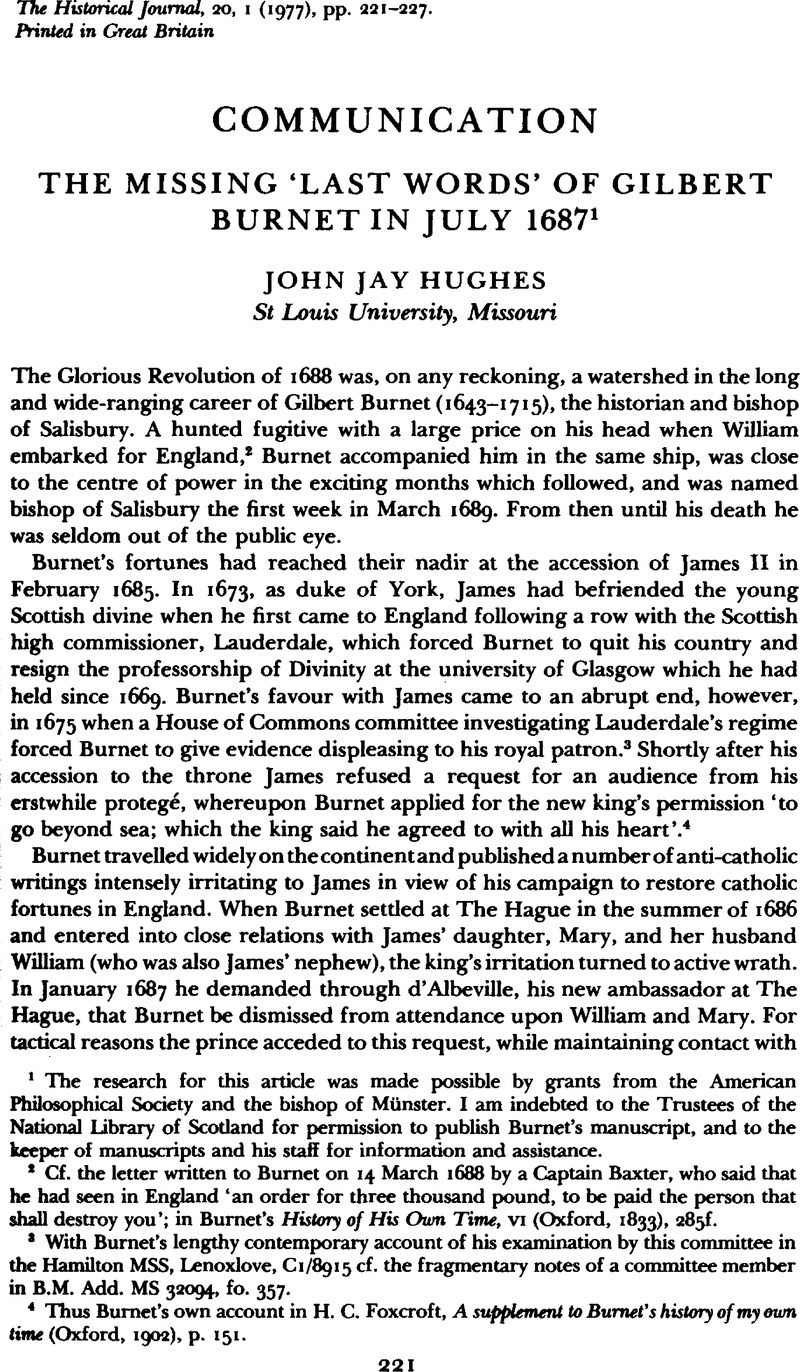Article contents
The Missing ‘Last Words’ of Gilbert Burnet in July 16871
Published online by Cambridge University Press: 11 February 2009
Abstract

- Type
- Communication
- Information
- Copyright
- Copyright © Cambridge University Press 1977
References
2 Cf. the letter written to Burnet on 14 March 1688 by a Captain Baxter, who said that he had seen in England ‘an order for three thousand pound, to be paid the person that shall destroy you’; in Burnet's History of His Own Time, VI (Oxford, 1833), 285fGoogle Scholar.
3 With Burnet's lengthy contemporary account of his examination by this committee in the Hamilton MSS, Lenoxlove, C1/8915 cf. the fragmentary notes of a committee member in B.M. Add. MS 32094, fo. 357.
4 Thus Burnet's own account in Foxcroft, H. C., A supplement to Burnet's history of my own time (Oxford, 1902), p. 151Google Scholar.
5 Cf. d'Albeville's reports to the earl of Melfort in B.M. Add. MS 41814, fos. 135, 136, 150 and 239.
6 Cf. Burnet's account in Foxcroft, Supplement, p. 252Google Scholar.
7 Cf. Supplement, p. 522Google Scholar, n. 2; and Clarke, T. E. S. and Foxcroft, H. C., A Life of Gilbert Burnet (Cambridge, 1907), p. 234Google Scholar.
8 Adv. MS 81.1.22, fos. 34–38. In a letter to the author dated 18 February 1975 I. C. Cunningham, Assistant Keeper of Manuscripts, stated: ‘The documents now bound up as Adv. MS 81.1.22 were found in May 1939 in a box of records of Iinlithgow which were being transferred to the Scottish Record Office; but where this box came from is unfortunately not recorded…The collection was apparently put together in the 1820s (the watermark of the paper on which the descriptions of the items are written is 1820); some of the items at least belonged to John Nichols, the antiquary and printer, but the descriptions are not in his hand.’
9 Cf. De Beer, E. W., ‘The marquis of Albeville and his brothers’, English Historical Review, XLV (1930), 397–408CrossRefGoogle Scholar; and for a more favourable view Kenyon, J. P., Robert Spencer, earl of Sunderiand (London, 1958), p. 136Google Scholar.
10 The reference is to protestant controversies over predestination.
11 I.e. members of religious orders as opposed to the secular or diocesan clergy, whom Burnet believed, with some reason, to hold more moderate views.
12 The reference is to the first three chapters of the Book of Revelations.
13 In November 1686 the English Quaker, William Penn, visited Prince William at The Hague on behalf of King James, to try to enlist the prince's support for the repeal of the Test Acts. Burnet reports that Penn ‘pressed me to go over to England…and assured me the king would prefer me highly’. Burnet declined the offer. Cf. History of his own time, III (Oxford, 1833), 141Google Scholar.
14 I.e. ‘decides’, as in ‘deliver judg ment’.
15 They had been printed anonymously in Holland and were reprinted in G. Burnet, A CoUection of Eighteen Papers relating to the Affairs of Church and State during the Reign of King James the Second (Seventeen whereof written in Holland and first printed there). Reprinted at London for…Starkey and…Chiswell, 1689. A modern facsimile edidon of this useful collection is available from Scholarly Resources, Wilmington, Delaware.
16 Cf. Eighteen Papers, pp. 1–9Google Scholar.
17 Ibid. pp. 10–24.
18 Ibid. pp. 45–55.
19 Ibid. pp. 25–37.
20 Burnet identifies die passage he is here translating from die Latin by die marginal notation: ‘Tacitus, lib 16 Anna ad finem’. His marginal transcription of die Latin text is omitted here. The crowded writing and die condition of die manuscript in its present binding are responsible for die gaps and illegibilities noted below.
21 Less than two years later this disclaimer became inoperative, as Burnet in his sermon at die coronation of William and Mary made die very application which he here disavows: cf. A Sermon Preached at the Coronation of William III and Mary II… By Gilbert, , Lord Bishop of Salisbury. London:…Starkey and…Chiswell… 1689, p. 24Google Scholar.
- 1
- Cited by


